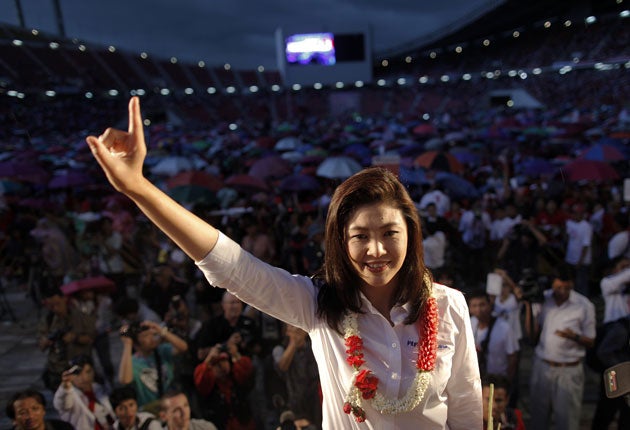Thai voters put their faith in Thaksin's novice sister

In Bangkok's Rajamangala stadium, a venue usually occupied by Thailand's national football team, there were a lot of red shirts. Most of them were decidedly wet red shirts.
Yingluck Shinawatra and her senior colleagues in the Puea Thai party may have been able to select the location for their final rally for supporters before tomorrow's election. But they could do absolutely nothing about the weather.
So by the time the buzzing, beaming Ms Yingluck made her way to the stage in a partly covered electric golf cart to deliver her spirited political battle cry, many of her supporters – who show their political allegiances by the colour of their shirts – had been standing beneath a drenching monsoon storm for more than an hour. It did not appear to have dampened their enthusiasm.
"Many people say why are you doing politics," said the 44-year-old businesswoman, who had somehow managed to stop her make-up from getting smudged by the downpour. "What they should be saying is 'what will the people get from us doing politics?'"
Ms Yingluck has been one of the genuine surprises of Thailand's election. A month ago when her elder brother Thaksin Shinawatra, a former prime minister of the country who lives in exile in Dubai, named her to lead his party's campaign, many people raised an eyebrow. They pointed out that she had no political experience, that she lacked a public profile and that the voting public would associate her with the policies of her brother.
In fact, each potential weakness has been shown to be a benefit. Her lack of political baggage has allowed her to campaign on her strengths as a businesswoman, her lack of public profile has meant she has been a new, undamaged personality, and her association with her brother – indeed, he went as far as to say she was a clone of him – has meant she has attracted the base support he still appeals to. The most recent polls have put her up to 10 points or more ahead of the incumbent Prime Minister, Abhisit Vejjajiva.
It is also clear she has learned the trade of hard-elbowed politics quickly enough. Those who have followed her on the election trail in recent days talk of a confident, natural campaigner who has been able to connect with the ordinary voter. She is also a powerful orator, as was clear during her performance before thousands of her supporters last night. "Please give this woman a chance to bring peace to this country, to bring unity and reconciliation to this country," she declared, as the crowd roared and waved flags and banner bearing a large 1, the number on the ballot papers of her party.
Jirarat Hanpongpat is among the large numbers of Ms Yingluck's supporters who believe Thailand is ready for its first female prime minister.
"Thailand is definitely ready because women are more responsible and have better ability than men," she said yesterday afternoon, working at a noodle cart in the centre of Bangkok close to the Wat Patum temple. "Women are also more considerate than men and have greater attention."
Achieving reconciliation among Thailand's splintered society will be a tremendous challenge for whichever party emerges victorious after Sunday's vote – or after any horse-trading with smaller parties to build a coalition if no party wins a majority. Mr Thaksin, who was ousted in a coup in 2006 and subsequently convicted in absentia on corruption allegations, remains a deeply divisive figure: his popularity among the rural and urban poor is matched by the disdain in which he is held by most of the middle-class, particularly in the cities.
At the same time, Mr Abhisit has faced widespread criticism, not only as the economy has stumbled, but for his actions last spring when more than 90 people, mostly civilians, were killed in Bangkok in clashes with the authorities. A number of those who lost their lives were killed close to where Ms Hanpongpat had set up her noodle cart.
The government has set up a truth and reconciliation committee to look into the deaths and the protests that rocked Bangkok. Many have doubts it will deliver convincing answers. On this issue and several others, Ms Yingluck has been largely quiet. It has suited her and her party instead to stress the sort of populist policies that saw her brother twice elected – tax cuts, an increased minimum wage and free laptop computers for all children.
But those who had spent the evening in the rain at Rajamangala believe Ms Yingluck could be the one to help the country move forwards.
"We like her policies and we think she has ability," said Chuen Chut, a woman wearing a red shirt and being pushed in a wheel-chair.
"We have already seen what Thaksin could do, so we think she is the right choice. And I would like to see a female prime minister."
Join our commenting forum
Join thought-provoking conversations, follow other Independent readers and see their replies
0Comments